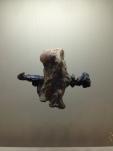Palm Sunday. Normally Christians would be walking through the streets with a bemused donkey before beginning Holy Week in church. Not this year. This year we have the unwelcome and uninvited gift of stepping back and re-focusing on what Christian faith – rooted in this Jesus who enters Jerusalem with us friends – says to us while the church is being the church differently.
When Jesus turned his face towards Jerusalem he knew what might await him there. You don’t challenge religious authority or the military powers of the Roman Empire without considering the likely cost. Messiahs were popping up all over the place (see ‘The Life of Brian’) – all offering ultimate solutions to those who ‘believe’, but all ending up on crosses. Jesus was, like the Old Testament prophets, open-eyed about power and resistance and cost.

I can only imagine the loneliness of Jesus – accompanied by friends who just don’t get what is going on here … in the words of the great Crowded House song, ‘Together Alone’. It is often harder to be lonely in a crowd when you see what no one else sees.
So, Jesus is alone in company. His friends don’t spot this aloneness and read the ‘now’ as the end. And the crowds will soon turn when the wind blows in a different direction.
Jesus is going to challenge power – social, political, military, religious – right at its heart. But, he is not going to do it in the way anyone might suppose. He will look feeble and ridiculous. He will look like he has lost the argument. The crowds – even some of his friends – will suspect he’ll has been a fraud all along. And Jesus knows they won’t even begin to understand all this until much, much later.
I think Palm Sunday opens up the space to re-think who Jesus is and what he is about. If I think he really is the messiah, then is this because he simply confirms to an image (an assumption?) of what messiahship looks like? Is it because I find it convenient to my theological preferences? Or am I as open as his friends ultimately needed to be to re-think, re-imagine, re-conceive what hope, freedom and commitment look like through the eyes of this Jesus?
Am I with the crowd – Jesus to offer quick entertainment and easy solutions; with his friends – hopeful, but stuck with a prejudice of what Jesus ought to be, do and say; or with Jesus himself – prepared to stare even my own convictions in the eye and examine them afresh under the silent gaze of the man heading toward a cross?
